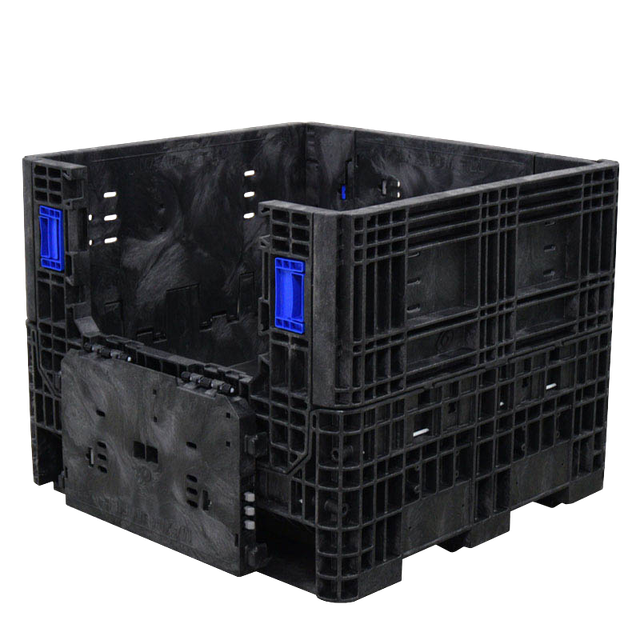The Role of Mass Plastic Containers in Effective Recycling Practices and Sustainability
Bulk plastic containers are essential to contemporary recycling efforts. Their layout boosts the efficiency of material collection and transport, adding to sustainability goals. These containers not just optimize area but likewise help in checking contamination degrees. Nevertheless, their implementation is not without difficulties. Recognizing the full range of their impact reveals a complex relationship between logistics and environmental responsibility that calls for further exploration.
Recognizing Bulk Plastic Containers
Mass plastic containers function as an essential part in numerous industries, facilitating the storage and transportation of items. These containers are usually made from robust materials such as high-density polyethylene (HDPE) or polypropylene, which provide toughness and resistance to ecological variables. Their design usually consists of functions like stackability and modularity, enabling for effective use space during both storage space and transit.
Industries such as farming, food processing, and producing frequently utilize mass plastic containers due to their lightweight nature and ease of handling. The containers are available in various sizes and setups, providing to the details needs of various items. Their versatility expands beyond mere performance; they can also be customized with covers, deals with, and labeling alternatives to improve usability - plastic bulk containers. Therefore, mass plastic containers play an important duty in maximizing logistics and supply chain operations throughout several sectors, thus adding to overall performance and cost-effectiveness
Advantages of Using Bulk Plastic Containers in Recycling
The application of mass plastic containers greatly improves the performance of the procedure when companies prioritize reusing initiatives. These containers are made to maximize space, permitting the storage space and transport of bigger amounts of recyclable materials. This leads to less journeys to recycling facilities, thereby lowering fuel usage and linked emissions.
Additionally, bulk plastic containers are immune and sturdy to different environmental factors, making sure that materials continue to be secured throughout handling and transit. Their light-weight style even more adds to lower transport costs.
Moreover, the uniformity of these containers facilitates much better sorting and handling of recyclable materials, which can improve overall recycling rates - plastic bulk containers. Organizations that adopt bulk plastic containers also demonstrate a dedication to sustainability, positively influencing their brand name picture. Inevitably, these benefits not just improve recycling techniques however also add to more comprehensive ecological goals
Exactly How Mass Plastic Containers Facilitate Material Collection
Efficient material collection is considerably improved by the use of bulk plastic containers, as they provide a efficient and organized service for gathering recyclable items. These containers are designed to accommodate large volumes of materials, which streamlines the sorting and storage procedure. Their stackable design maximizes area utilization, making it much easier for facilities to arrange recyclables without clutter.
On top of that, mass plastic containers are durable and weather-resistant, permitting exterior placement without degradation. This strength ensures that materials continue to be safeguarded until they are collected for processing.

The harmony in shapes and size of these containers promotes standardization throughout collection points, allowing far better tracking of recyclable quantities. Moreover, their transparent nature permits simple exposure of contents, assisting in the monitoring of contamination degrees and ensuring that only proper products are accumulated. Generally, mass plastic containers play an important duty in simplifying the product collection process, therefore advertising reliable recycling methods.
Transportation Effectiveness and Environmental Impact
Transport effectiveness plays a vital function in the reusing process, especially through the optimization of tons capacity in bulk plastic containers. By maximizing the volume of product carried, firms can greatly lower the number of journeys required, therefore decreasing their carbon footprint. This strategy not only boosts functional performance however additionally adds to a lot more lasting ecological techniques.

Enhancing Tons Capability
Although optimizing lots ability is commonly forgotten, it plays a necessary duty in boosting transport effectiveness and lessening ecological influence in reusing methods. By making the most of the volume that bulk plastic containers can hold, recycling procedures can minimize the number of journeys required for transport. This not just lowers fuel usage however likewise reduces the damage on lorries. Reliable lots management permits facilities to make use of space effectively, guaranteeing that each transportation cycle is as effective as feasible. In addition, well-optimized tons can bring about better negotiations with logistics providers, potentially minimizing overall costs. Eventually, enhancing load ability adds to an extra lasting recycling system by fostering effective source use and decreasing waste produced during transportation.
Decreasing Carbon Impact
As reusing procedures undertaking to decrease their ecological influence, decreasing the carbon impact related to transportation becomes an important goal. Bulk plastic containers play an essential role in accomplishing this aim by enhancing lots performance and enhancing logistics. Their light-weight yet durable layout enables maximum freight space use, minimizing the variety of trips needed to transfer materials. By consolidating deliveries, recycling facilities can reduce gas consumption and greenhouse gas emissions. Additionally, purposefully situating recycling facilities reduces transport distances, in addition reducing carbon outcomes. Employing fuel-efficient automobiles and alternative power resources improves total sustainability. By integrating these methods, the reusing industry can significantly decrease its carbon footprint, contributing to a much more sustainable future.
Obstacles in the Usage of Mass Plastic Containers

Contamination Concerns
Contamination problems stand for a considerable difficulty in the reliable use mass plastic containers within reusing methods. These containers usually collect deposits from previous materials, bring about combined materials that can impede the recycling procedure. Impurities such as food waste, chemicals, or non-recyclable products can endanger the stability of the entire batch, leading to raised disposal prices and decreased recycling prices. In addition, inappropriate cleansing or sorting can intensify these issues, making it tough for reusing facilities to process materials effectively. The existence of pollutants not only impacts the quality of recycled items however likewise threatens the total sustainability initiatives intended at decreasing plastic waste. Resolving these contamination challenges is crucial for boosting the efficacy of mass plastic container recycling.
Recycling Framework Limitations
Ineffectiveness in reusing framework postures substantial obstacles for the efficient monitoring of wikipedia reference bulk plastic containers. Many recycling centers lack the capability to process huge volumes of these containers efficiently, causing increased delays and expenses. Moreover, inadequate arranging technologies typically cause contamination, as bulk containers might be blended with other products, complicating the reusing procedure. Limited transportation options additionally impede the motion of mass plastic containers to proper recycling centers, bring about raised garbage dump waste. Furthermore, a lack of standardized protocols for bulk container reusing develops confusion among services and customers, additionally making complex efforts to advertise sustainability. Addressing these framework limitations is vital to improve reusing methods and take full advantage of the possibility of mass plastic containers in a circular economic climate.
Finest Practices for Carrying Out Bulk Plastic Containers
When organizations consider implementing mass plastic containers in their recycling methods, they ought to prioritize a strategic method that improves efficiency and decreases contamination risks. First, choosing the appropriate container size and kind is necessary to fit the volume of materials being refined. Organizations needs to likewise establish clear labeling and signs to assist users on appropriate disposal methods, decreasing confusion and mistakes. Regular training sessions for team can additionally reinforce these practices, making sure everyone comprehends their duties in keeping reusing stability.
Furthermore, companies ought to execute a routine maintenance schedule to examine and tidy containers, preventing the buildup of impurities. Partnering with neighborhood recycling facilities can likewise improve the collection procedure, making certain that products are properly processed. Lastly, organizations need to monitor and examine their reusing metrics, utilizing this information to improve techniques gradually and promote continual enhancement in their sustainability efforts.
The Future of Mass Plastic Containers in Lasting Practices
As companies progressively focus on sustainability, the duty of mass plastic containers in recycling practices is readied to evolve substantially. Innovations in materials scientific research are leading to the advancement of eco-friendly and recyclable alternatives, enhancing the ecological benefits of bulk plastic containers. Furthermore, the implementation of closed-loop systems will certainly permit easier collection and repurposing of these containers, reducing waste and source intake.
Technical developments, such as wise tracking systems, will certainly allow business to keep an eye on the lifecycle of bulk containers, boosting performance in recycling processes. As customer demand for sustainable techniques expands, services will likely take on bulk plastic containers designed for reuse and lasting value. Cooperation in between federal governments and sectors will cultivate the establishment of standardized reusing methods, making certain that mass containers are properly integrated right into wider sustainability efforts. On the whole, the future of mass plastic containers appears encouraging, with considerable potential for adding to a circular economy.
Often Asked Concerns
Just How Are Mass Plastic Containers Made and What Materials Are Made use of?
Bulk plastic containers are commonly made from high-density polyethylene (HDPE) or polypropylene (PP) These materials are refined via injection molding or blow molding techniques, leading to durable, light-weight containers ideal for numerous storage and transport needs.
Can Bulk Plastic Containers Be Reused Multiple Times Prior To Recycling?
Yes, bulk plastic containers can be reused several times prior to reusing. Their toughness and design enable for repeated usage in numerous applications, promoting sustainability and resource performance while minimizing the demand for new containers.

What Qualifications Exist for Mass Plastic Containers in Recycling?
Numerous certifications for bulk plastic containers include the Recycling Partnership's certification, the Cradle to Cradle see post Licensed ™ standard, and the Lasting Packaging Coalition's guidelines, guaranteeing containers satisfy details ecological and recyclability criteria for effective recycling.
Exactly How Do Bulk Plastic Containers Contrast to Various Other Recycling Storage Space Options?
Mass plastic containers supply higher resilience and ability contrasted to various other recycling storage space choices, lowering the danger of contamination and promoting efficient transportation. Their layout sustains far better organization, boosting overall performance in recycling procedures.
What Is the Life-span of a Bulk Plastic Container in Recycling Processes?
The life expectancy of a mass plastic container in recycling procedures normally ranges from 5 to ten years, depending upon use, worldly quality, and ecological problems, allowing for multiple cycles of usage before eventual disposal or recycling.
When companies prioritize reusing efforts, the application of mass plastic containers considerably improves the performance of the procedure. Transportation effectiveness plays a vital duty in the recycling process, particularly with the optimization of lots capability in bulk plastic containers. The usage of mass plastic containers in recycling practices deals with substantial difficulties, specifically worrying contamination concerns and limitations within reusing infrastructure. Contamination issues stand for a significant obstacle in the reliable usage of mass plastic click for source containers within reusing practices. When organizations think about executing mass plastic containers in their reusing methods, they need to prioritize a tactical strategy that boosts performance and minimizes contamination risks.